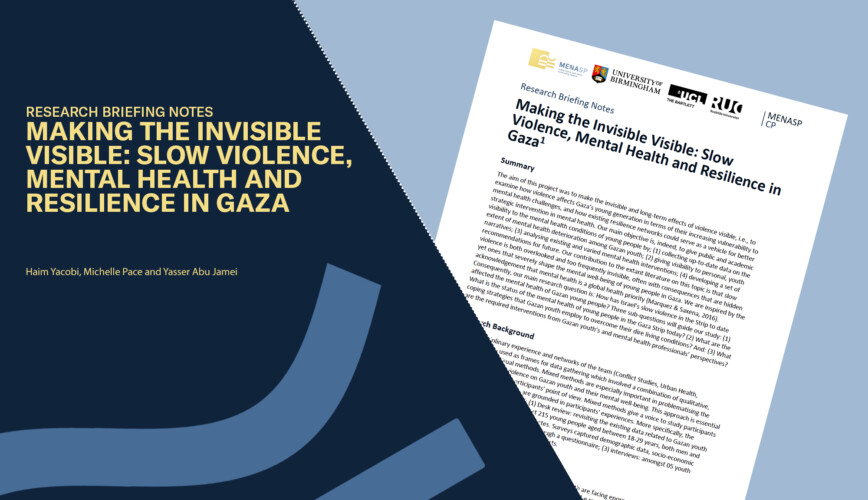The aim of this project was to make the invisible and long-term effects of violence visible, i.e., to examine how violence affects Gaza’s young generation in terms of their increasing vulnerability to mental health challenges, and how existing resilience networks could serve as a vehicle for better strategic intervention in mental health. Our main objective is, indeed, to give public and academic visibility to the mental health conditions of young people by; (1) collecting up-to-date data on the extent of mental health deterioration among Gazan youth; (2) giving visibility to personal, youth narratives; (3) analysing existing and varied mental health interventions; (4) developing a set of recommendations for future. Our contribution to the extant literature on this topic is that slow violence is both overlooked and too frequently invisible, often with consequences that are hidden yet ones that severely shape the mental well-being of young people in Gaza. We are inspired by the acknowledgement that mental health is a global health priority (Marquez & Saxena, 2016). Consequently, our main research question is: How has Israel’s slow violence in the Strip to date affected the mental health of Gazan young people? Three sub-questions will guide our study: (1) What is the status of the mental health of young people in the Gaza Strip today? (2) What are the coping strategies that Gazan youth employ to overcome their dire living conditions? And: (3) What are the required interventions from Gazan youth’s and mental health professionals’ perspectives?
*This research was completed a short time before October 7th.
DOI: 10.48352/uobxmenasp.0014
Authors:
Haim Yacobi, Professor of Development Planning (The Bartlett Development Planning Unit (DPU) at UCL ), Michelle Pace, Professor in Global Studies (Roskilde University) and Yasser Abu Jamei (Gaza Community Mental Health Programme)
This project is supported by the Middle East and North Africa Social Policy Network (MENASP) at the University of Birmingham, in the framework of its ‘strengthening social welfare and security in the MENA region’ research programme, funded by the UK Arts and Humanities Research Council’s Global Challenges Research Fund.
Disclaimer: The opinions expressed in this publication are those of the authors. They do not purport to reflect the opinions or views of the Middle East and North Africa Social Policy (MENASP) Network or the University of Birmingham.
